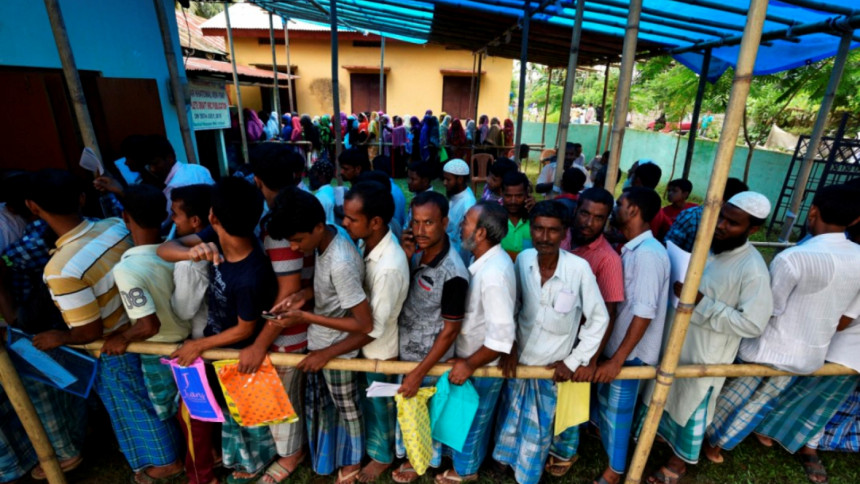Bangladesh should not be the dumping ground for NRC left-outs

India's publication of the National Register of Citizens (NRC) in Assam, a province that shares its borders with Bangladesh, virtually strips 19 lakh people of their citizenship, pending appeals. The register is essentially a list of people who failed to prove they came to India before March 24, 1971, just before Bangladesh's war of independence began.
Top political leaders of India have said on several occasions that they need to identify illegal Bangladeshi migrants. The fate of these "illegal migrants" is still unclear. But it is quite evident from the rhetoric that there will be attempts to eventually deport these people as illegal Bangladeshi residents from Assam and the rest of India.
India shares a 4,000-km-plus border with Bangladesh, along West Bengal (which accounts for more than half the border), Assam (the least, after Mizoram), Meghalaya, Tripura and Mizoram. Some of the border is riverine, and impossible to fence off. Even on the fenced grounds, the border is permeable. A World Bank publication from 2016 listed the Bangladesh-India "migration corridor" as the busiest after that of Mexico-United States and Ukraine-Russia.
Given the general perception in India that millions of illegal Bangladeshi migrants work in India, the demand for NRC is being raised in other Indian states as well, and the ruling BJP appears very sympathetic to the demand and quite resolute in eventually deporting them. The same rhetoric prevails in West Bengal and Tripura. It is nothing but a case of political expediency and the Assam NRC is an example.
However, the commonly manufactured Indian myth that millions of "Bangladeshi nationals" live in Assam has been debunked by its own device. Having excluded mostly non-Muslims from a previous list, the NRC now claims the number of "illegal migrants" stands at 1.9 million.
The number would presumably decrease as people appeal and their cases are resolved. Another point to note is that it is only about five percent of Assam's population. It is not unusual for a third-world country or state to have five percent of people who do not have valid documents of citizenship. The scenario would be similar in Bangladesh, too, if one were to conduct such a survey.
Ironically, the whole process had been exercised to exclude the Muslim community. But according to the NRC, the majority of the excluded were from the Hindu community. The BJP government should realise that the whole approach to see the issue through the lends of religion has been a great mistake and has backfired.
At the same time, Bangladesh should be prepared to counter such a move diplomatically and politically. Bangladesh is already suffering from the massive exodus of Rohingya refugees, with locals getting wary as they are bearing the brunt of about a million refugees living in their vicinity. Another influx would have dire consequences on the economy, to put it mildly.
Although India has, time and again, insisted that this is an "internal matter" of the country, experts believe that Bangladesh should, in the event that the situation in Assam deteriorated further, engage India in bilateral discussions regarding the eventual consequence of this apparently discriminatory NRC, and make the outcome of the discussion public.
It may well be that the "illegal migrants" are herded into camps where life would be difficult and people would be unwilling to reside there. This could trigger a spontaneous exodus into Bangladesh and the government should have a clear strategy to counter such a scenario, unlike the time of the Rohingya exodus when there was no such preparation.
Currently, India and Bangladesh enjoy very close ties. Dhaka has helped India deal with militants operating from Bangladesh. Both countries also enjoy a robust trade partnership. India is currently the second-largest source of Bangladeshi imports while the value of exports from Bangladesh to India crossed USD 1 billion in the 2018-19 financial year.
Bangladesh should forcefully articulate that it is not a dumping ground for NRC left-outs. The friendly relationship that exists between the two countries must be strengthened. Any attempt to disrupt the relations would also affect regional stability and peace. That is something that nobody wants.
Mohammad Al-Masum Molla is a reporter at The Daily Star.


 For all latest news, follow The Daily Star's Google News channel.
For all latest news, follow The Daily Star's Google News channel. 



Comments